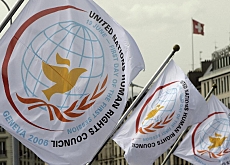
UN rights meeting ends in gridlock

The fledgling United Nations Human Rights Council ended its second session in disarray on Friday after failing to agree on how to address the world's worst abuses.
Government delegations were unable to reach agreement on the 44 resolutions proposed during the three-week session – a small blessing in disguise for Switzerland, for whom one of its three resolutions remains controversial.
The Swiss delegation presented three resolutions during the second session: on Nepal, the independence of judges in countries going through democratic changes and human rights in the fight against terrorism.
Although the first two questions are relatively straightforward, the last resolution, which focuses on detainees’ rights under international law, access to a fair trial and a judge, and protection against torture, could create a diplomatic incident between Bern and Washington.
Although the text was intended for all states, there are clear references to US practices in the fight against terror. Certain countries have already expressed their desire to amend the resolution.
“If Cuba and its friends decide to add the terms “Guantanamo” and “United States” to the text, Washington won’t be slow to react,” explained a diplomat anonymously.
Major differences
Yet this resolution and 43 others proposed by the council’s member states were eventually deferred from the October meeting to be taken up again on November 27 ahead of a final session for the year.
Mexican ambassador Luis Alfonso de Alba, who chairs the council, tried unsuccessfully to get consensus on a statement condemning violations in the occupied Palestinian territories, the Golan Heights, Lebanon and Darfur. The text also expressed concern about religious intolerance and the “right to development”.
Despite his efforts, he was unable to reduce differences of opinion in the time available. For western countries, the section on the Middle East was unacceptable because Israel was the only state being pilloried. And the African group of nations felt the proposal on Darfur contained too many mentions of human rights violations.
On religious freedoms, western countries wanted to include reference to freedom of speech. And to top it off, the Asian nations claimed that Islam was cited too often in the text.
Swiss efforts
Switzerland, via its ambassador to the United Nations and council vice-president, Blaise Godet, tried in vain to mediate the discussions.
Switzerland’s Walter Kälin, a lawyer who drew up the blueprint for the Human Rights Council, said he was disappointed but not surprised.
“Governments have not changed since the creation of the council. It is perfectly normal for there to be disagreements between states or blocks of states,” he said.
“Setting up the council is a consensual process. We therefore can’t expect it to be perfect. But the new council is a forum that allows discussion on reforms of human rights instruments, which was not possible in the old UN Human Rights Commission.”
The council has until June 2007 to prove itself and demonstrate that discussions have led to real progress.
swissinfo, with Carole Vann and Juan Gasparini from Infosud agency
Switzerland was elected to the Human Rights Council with a three-year mandate on May 9. The vote took place at the UN General Assembly in New York.
The mandate can only be renewed once. Switzerland must then cede its place to another country from the western group, before being able to stand for election again.
In the second session in September, Switzerland will present a universal index of human rights containing more than 1,000 documents on how to run the new body.
The second session of the United Nations Human Rights Council took place in Geneva from September 18 until October 6.
The Human Rights Council sat for the first time in Geneva from June 19-30.
The council will meet at least three times a year for no less than ten weeks, and can convene emergency sessions. Its predecessor, the Human Rights Commission, met for just an annual six-week session.
The next sessions will take place November 27-December 8.

In compliance with the JTI standards
More: SWI swissinfo.ch certified by the Journalism Trust Initiative





























You can find an overview of ongoing debates with our journalists here . Please join us!
If you want to start a conversation about a topic raised in this article or want to report factual errors, email us at english@swissinfo.ch.